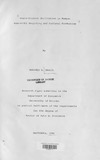| dc.description.abstract | Kenya's rapid industrialization since independence has generated immense benefits and economic opportunities for many. However, as population increases, burgeoning towns and a rapidly expanding manufacturing sector have been accompanied by growth of wastes and environmental pollution. Improper disposal creates health hazards, pollution of the environment and resource waste. In this respect, waste disposal has generated widespread concern, calling for need to salvage and re-use waste resources by adopting economically viable waste disposal practices.
Increasingly, developing and industrialized countries are discovering the benefits emanating from processing waste products. The utilization of waste products preserves valuable resources while solving potential environmental problems. Regrettably, Kenya has not gone far in the use of waste-resources. Many opportunities for industrialization are missed because waste-resources are inefficiently disposed. This study explores the problems associated with the disposal of two waste-resources; the recycling of waste-oil from imported virgin base-oils; and the utilization of maize-cobs in the production of furfural, a chemical intermediate with various important industrial uses.
The Kenyan Government is expected to play a leading role in stimulating interest and effecting programmes for waste-product utilization. To overcome problems associated with waste-product utilization in Kenya, the government should:
(a) Develop an incentive structure to accelerate the development of waste-oil recycling industry and overcome the tactics of multinational oil companies which frustrate the growth of the waste-oil recycling industry in Kenya.
(b) Increase its involvement in the independent evaluation of feasibility studies to avoid shortcomings and deficiencies in state sponsored projects.
(c) Enter into agreements with private foreign investors to share risks and accountability in the event of a project's collapse.
Finally, further research should be conducted in all aspects of resource wastes: collection, storage, processing, salvaging and utilization. | en |

